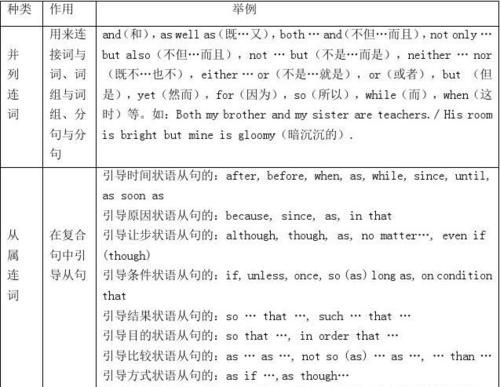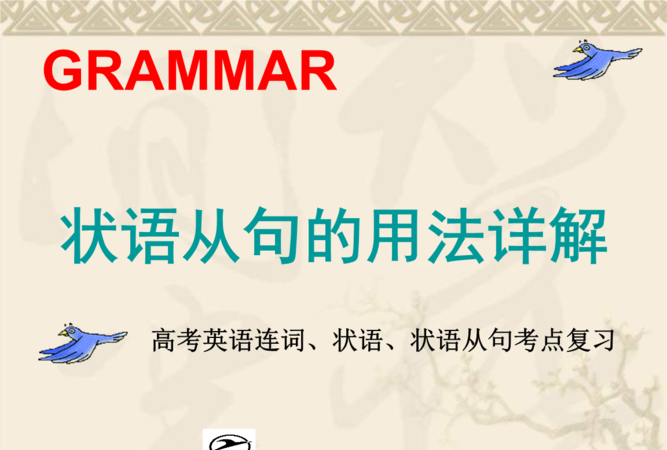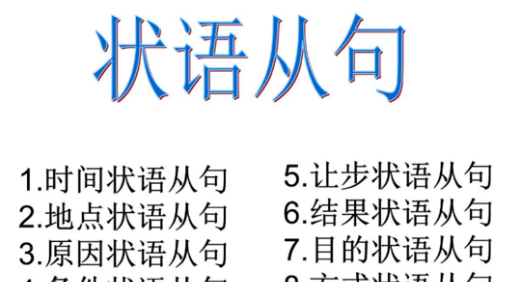本文目录
状语从句的连接词
详细一些介绍
1.时间状语从句
时间状语从句由when ,as(当…时候),whenever(无论何时),while(在…期间),as soon as(now that ,the moment, instantly, directly, immediately)(一…就),once(一旦…),since(自…时候以来),ever since(自…时候以来一直…),before(在…时候以前),after(在…时候以后),until(till)(直到…为止),every (each)time(每当…)等等引导。
You’ll be warmly welcomed whenever you come to call on us.
无论何时你来找我们,你都会受到热烈欢迎。
The people can never look on while the safety of the motherland is threatened.
当祖国安全受到威胁时,人民决不能袖手旁观。
As soon as(now that)you mention it, I do remember.
那件事你一提,我就想起来了。
Once they become masters of their countries, the oppressed people can work miracles.
一旦被压迫人民成了国家主人,就能创造出奇迹来。
用于肯定句意为“直到…为止”,用于否定句意为“直到…才”。可位于句首,一般不用在句首:
You cannot learn anything till(until)you rid yourself of complacency.
去掉自满,你才能真正学到一点东西。
Until you let me know I had no idea of it.
直到你通知我,我才知道那件事。
另外,the first time和next time也可引导时间状语从句:
She gave me a good impression the first time I saw her.
我第一次见到她时,她就给我一个好印象。
Be sure to give our best regards to her next time you went to see your grander mother in the hospital.
下次你去医院看望你祖母时,一定要代我们向她问候。
Ever since he moved to the country, he has lived there.
自从他迁到农村以来,就一直住在那儿。
Every(Each)time I catch cold I have a headache.
每当我伤风,头就痛。
2. 地点状语从句
地点状语从句由连接副词where, wherever(无论何处)引导:
Where there is oppression, there is resistance.
那里有压迫,那里就有反抗。
Wherever you work you cannot back out.
无论你在什么地方工作,都别打退堂鼓。
3. 原因状语从句
原因状语从句有连接词as(由于), because(因为), since(既然), now that(既然), seeing that(鉴于), considering that(考虑到), inasmuch as(因为,由于), not that…but that(不是因为…而是因为)等引导。
As(Since)the sun is shining brightly today, the temperature becomes high.
(as 和since表示明显的原因)温度升高了,因为今天阳光灿烂。
The demand of walking tractors made in our plant exceeds supply because they have a much greater efficiency.
我们厂生产的拖拉机供不应求是因为他们的效率高得多。(because表示不明显的原因)
Now that (Seeing that)he is very ill, I’ll do it for him.
既然他病重,我会代他做那件事。
Inasmuch as we serve the people, we are not afraid to have our shortcomings pointed out.
因为我们是为人民服务的,所以不怕别人指出我们的缺点。
I always hesitate not that I don’t want to go, but that I have no time.
我总是犹豫不决,不是因为我不想去而是因为我没空。
在形容词后的从句也可看成是原因状语从句,连接词that有时可省去:
She is proud that her husband a man of many gifts.
她为她的丈夫是个多才多艺的男子汉而自豪。
I'm sorry (that) I haven't done as much as I should.
很抱歉我做的很不够。
4. 条件状语从句
引导状语从句的连接词有if, unless(=if…not)除非…,in case 万一,suppose(=supposing)假定,so (as)long as 只要,so (as)far as据…,就…,on condition that(=provided, providing that)假若,granted(或granting)that就算…, but that 要不是…,等等。
If you keep on. you'll succeed in time.
如果你坚持下去,总有一天你会成功的。
Unless air is first removed from a bulb, the filament will burn up.
如果灯泡里的空气不先抽尽,灯丝就会烧断。
Suppose(Supposing)we are given the cold should, what shall we do?
假如遭到冷遇,我们怎么办?
So (as )long as we are vigilant in peace time we can remain invincible.
只要我们居安思危,就能立于不败之地。
Send me a message in case my aunt die of an illness.
万一我婶婶病故,给我捎个口信来。
Granted(Granting)that you have made some achievements, you should not be conceited.
就算你取得一些成就,也不应该骄傲自满。
The girl would have fallen into the river but that I caught her.
要不是抓住了那个女孩,她就掉进河里去了。
5. 方式状语从句
引导方式状语从句的连接词有as(好像),just as(正如),as if(as though)(好像),according as(按照),rather than that(而不是)等。
He gave his life for the revolution just as he made a vow when joining the Party.
正如他入党时宣誓的那样,他为革命献出了生命。
I’ll stay at home or be abroad according as the situation requires.
我是留在国内或是出国,得看形势的需要。
I should help you rather than that you help me.
应该是我帮助你而不是你帮助我。
6. 让步状语从句
引导让步状语从句的连接词有though(although)虽然,even if(even though)即使,as虽然,while虽然,whether不管… no matter how(who)what, which, when, where)= however(whoever, whatever, whichever, whenever, wherever)不管怎样(无论谁,无论什么,无论哪一个,无论何时,无论何处)等。
Although(Though)he was badly wounded,(yet)he flat refused to quit the battle line.
虽然他身负重伤,但坚决不下火线。
(although, though引导的从句中,主句不能用but(是等立连词),但可用副词yet)
You mustn’t talk nonsense even if (even though)you are a elder member of our family.
即使你是我们家的长辈,也不要胡说八道。
While I admit his good points, I can see his shortcomings.
尽管我承认他的缺点,我还是看到了他的缺点。
We’ll resolutely wipe out the intruders whether they come from the land, the sea, or the air.
不管侵略者从陆上来,从海上来,或是从空中来,我们都坚决于以消灭之。
Diligent as my sick father is, his ability is not equal to his ambition.
虽然我生病的父亲很勤奋,可仍力不从心。(as引导让步状语从句,以倒装形式出现(见上例))
7. 目的状语从句
引导目的状语从句的连接词有that(so that, in order that)以便,为了for fear that(或lest)免得,in case以防,等。
Those tourists climbed very high that (so that, in order that)they might get a better view.
那些旅游者爬得很高,以便看得更清楚。
The driver looked over the engine carefully lest (for fear that)it should go wrong on the way.
司机仔细检查了发动机,以免车子在路上出毛病。
(在lest(for fear that)引导的从句中,谓语用should+动词原形)
Take more clothes in case weather gets cold.
多带点衣服以防天气转冷。
8. 结果状语从句
引导结果状语从句的连接词有that(so that)结果…,so(后跟形容词或副词)…that如此…以至于,such(后跟名词)…that这样…以至于,等。
What’s the matter that up till now my son still hasn’t answered my telegram.
怎么回事,至今我儿子仍没给我回电报。
The persons present worried so(修饰worried)that they could hardly have their dinner.
与会的人急得几乎吃不下饭。
She spoke English so fluently that even the foreigners had to admire her at heart.
她英语讲得如此流利甚至连外国人也从心底里佩服她。
Yesterday I got so tired that I could not wake up all night.
昨天我非常疲倦,结果整夜也未醒过。
The film star sang in such a high voice that she could have herself heard by everyone.
那个影星高声唱歌以便让每个都能听见。
注:that, so that既可引导目的状语从句,也可引导结果状语从句。可从两方面加区别:1. 目的状语从句中谓语需用情态动词+动词原形,而结果状语从句则不一定;2. 目的状语从句表示主句谓语动作发生的动机,而结果状语从句则表示主句谓语动作的必然结果。
9、比较状语从句
引导比较状语从句的连接词有as…as(像…一样),not so …as(不及…一样),than(比…)等。
He looks as nervous as I do.
他看上去与我一样紧张。
The alloy doesn’t burn so easily as the pure metal(does).
合金不如纯金属那样易于燃烧。
In the world travels faster than light (does).
世界上没有什么东西比光传播得更快了。

状语从句有哪些
状语用来修饰动词、形容词、副词,通常由副词担任。如:He works hard .(他工作努力)
高中我们常见的 状语从句主语有以下几种:
1,时间状语,when my mother came home,I was cooking.
2, 地点状语,The factory where we visited it last year is very big.
3,原因状语,I was late for school because my mother was ill.
4,让步状语从句,Though he was a chlild, he can do lots of things.
5,方式状语从句,方式状语从句通常由as, (just) as…so…, as if, as though引导
Always do to the others as you would be done by.
等等了。给点练习你自己看看啊,引导词?上面就有。或者你做了练习就知道了有哪些了。
1. —What was the party like?
—Wonderful. It’s years __________I enjoyed myself so much.
A. after B. before C. when D. since
2. Mother was worried because little Alice was ill, especially _______Father was away in France.
A. as B. that C. during D. if
3. Why do you want a new job __________you got such a good one already?
A. that B. where C. which D. when
4. After the war, a new school building was put up ___________there had once been a theatre.
A. that B. where C. which D. when
5. You will be late ______________you leave immediately.
A. unless B. until C. if D. or
6. ___________, Mother will wait for him to have dinner together.
A. However late is he B. However he is late
C. However is he late D. However late he is
7. If we work with a strong will, we can overcome any difficulty, ______________great it is.
A. what B. how C. however D. whatever
8. We won’t give up ______________we should fail ten times.
A. even if B. since C. whether D. until
9. She doesn’t speak ____________her friend, but her written work is excellent.
A. as well as B. so often as C. so much as D. as good as
10. He’ll be happy ____________he may be.
A. when B. if C. because D. wherever
1—5 DADBA 6—10 DCAAD
希望对你有用。

状语从句有哪些
状语从句 (Adverbial Clause) 状语从句指句子用作状语时,起副词作用的句子。状语从句中的从句可以修饰谓语、非谓语动词、定语、状语或整个句子。
根据其作用可分为时间、地点、原因、条件、目的、结果、让步、方式和比较等从句。状语从句一般由连词(从属连词)引导,也可以由词组引起。从句位于句首或句中时通常用逗号与主句隔开,位于句尾时可以不用逗号隔开。

扩展资料
状语从句种类
1、时间状语从句
用表示时间的连词连接一个句子作状语,这样的主从复合句就是时间状语从句。连接时间状语从句的连接词有:when, before, after, while, as soon as, until, since...... 这里要注意一点的是,如果主句是一般将来时,从句只能用一般现在时表示将来意义。
2、地点状语从句
地点状语从句表示地点、 方位, 这类从句通常由where引导。
3、原因状语从句
引导原因状语从句的从属连词有because(因为), as(由于), since(既然), now(that)(既然), when(既然), seeing (that) (由于,鉴于), considering (that)(考虑到), given (that) (考虑到),for(为)等。
4、结果状语从句
结果状语从句是英语学科中的一个句型。从句常由so… that或such…that引导。掌握这两个句型,首先要了解so 和 such与其后的词的搭配规律。
5、方式状语从句
方式状语从句通常由as, (just) as…so…, as if, as though, by,with引导,多用来谈论某人的行为或者做某事的方式。
6、比较状语从句
比较状语从句是其中的一种,主要运用于形容词和副词的原级、比较级及最高级的句子之中。原级:as…as(和……一样),not so(as)…as …(和不一样);比较级:more…than(更);最高级:The most…in/of, the + 形容词+est…of/in。
7、让步状语从句
让步状语从句,是指状语从句中的一种,其本身也是状语从句。一般翻译为“尽管……”或“即使……”,就是我们日常生活中用的“退一步说…”的感觉。
8、目的状语从句
目的状语从句:从句部分是用以补充说明主句中谓语动词发生的目的的状语从句。
9、条件状语从句
由引导词if或unless引导的状语从句叫做条件状语从句。在英文中,条件是指某一件事情实现之后(状语从句中的动作),其它事情(主句中的动作)才能发生,通常译作“假如”。
参考资料来源:
百度百科—状语从句
英语状语从句有哪几种
英语状语从句分8种:
1.时间状语从句(adverbial clauses of time),多由连词引起。
(when,after,before,as,as soon as,as long as,since,whenever,once)
E.g. When we lived in town we often went to the theater.
It was a long time before I got to sleep again.
As the sun rose the fog dispersed(vt. 消散).
少数不由连词引起状语从句。
(now that,every time,each time,the moment,immediately,instantly,directly)
E.g. Directly he uttered(vt. 说出)these words, there eas a dead silence.
I had no sooner checked in the hotel than he arrived.
2.地点状语从句(adverbial clause of place)
(where,wherever,anywhere)
E.g. The church was built where there had once been a roman temple(n.寺庙).
Everywhere I go, I find the same thing.
3.方式状语从句(adverbial clause of manner),一般由as,like,as if引起。
E.g. I am as you can image short of money. 正如你能想象的那样,我很缺钱。
I did as she asked.
Do it as he does.
I feel just like I did when I was a boy.
I remember the whole thing as if it happened yesterday.
He glanced about as if in search of something.
4.原因状语从句(adverbial clause of reason), 一般由because,as,since,in case,还有两个词有相同的意思(seeing,considering)
E.g. He was angry because we were late.
As the soup was very salty, we were thirsty afterwards.
He took a spoonful(n.满满的一勺) and tasted it in case it was hot.
Seeing that it is ten o’clock, we shall not wait for her any longer.
5.条件状语从句,一般由if,unless,supposing, providing,as long as, granted that引起。
E.g. We sat on the grass if it was fine.
If I could afford it, I would buy a boat.
If necessary, ring me at home.
Supposing he can’t come, who will do the work?
6.让步状语从句(adverbial clause of concession),主要由although, though, even though, while,whereas。
E.g. Though we are poor, we are still happy.
Some praise him, whereas others condemn him.
Though not large, the room was well lit.
7.目的状语从句和结果状语从句(adverbial clause of purpose and adverbial clause of result),主要由so that,such that, in order that,otherwise,else.
E.g. Let’s take the front seats that we may see more clearly.
Give me back the money, otherwise I’ll ring the police.
Hurry up or else you’ll be late.(赶快,否则你就会迟到了。)
8.比较状语从句(adverbial clauses of comparison),主要由than ,as 引起。
E.g. You sing better than I do.
I haven’t done as much as I should have liked.(我没做得像我希望的那样好。)

以上就是关于九大状语从句连接词 ,状语从句的连接词的全部内容,以及九大状语从句连接词 的相关内容,希望能够帮到您。
